ALSO BY TAMAR E. CHANSKY
Freeing Your Child from Obsessive-Compulsive Disorder
FREEING YOUR CHILD FROM ANXIETY . Copyright 2004 by Tamar E. Chansky. All rights reserved. No part of this book may be reproduced or transmitted in any form or by any means, electronic or mechanical, including photocopying, recording, or by any information storage and retrieval system, without written permission from the publisher.
Published in the United States by Three Rivers Press, an imprint of the Crown Publishing Group, a division of Random House, Inc., New York.
Originally published in the United States in paperback by Broadway Books, an imprint of the Crown Publishing Group, a division of Random House, Inc., New York, in 2004.
THREE RIVERS PRESS and the Tugboat design are trademarks of Random House, Inc.
Visit our website at www.threeriverspress.com
Illustrated by Phillip Stern
Grateful acknowledgment is made to Crown Books, Random House, for permission to reprint and adapt drawings from Freeing Your Child from Obsessive-Compulsive Disorder. T. Chansky. Crown Publishers, 2001.
Figures 1, 9, 11, and 17.
Library of Congress Cataloging-in-Publication Data
Chansky, Tamar Ellsas.
Freeing your child from anxiety : powerful, practical strategies to overcome your childs fears, phobias, and worries / Tamar E.
Chansky; illustrations by Phillip Stern.
p. cm.
1. Anxiety in children. I. Title.
RJ506.A58C48 2004
618.928522dc22
2003065208
ISBN 978-0-7679-1492-5
eBook ISBN: 978-0-307-48511-3
v3.1_r2
For Phillip, Meredith, and Mireilla
Acknowledgments
I am very grateful to my agent, Gareth Eserky, who welcomed me in the publishing world with my first book and continues to be a trusted source of guidance and encouragement for the work I do. Thank-you to Patricia Medved and her assistant Beth Datlowe for their enthusiasm and care in bringing this book to fruition.
I feel fortunate to be working in a time when there are so many gifted colleagues who are working hard on behalf of anxious kids. I appreciate the contributions of Philip Kendall and John March in advancing both the science and practice of treating childhood anxiety disorders. Special thanks to Jeffrey Schwartz for his inspiring work and for a vote of confidence at a critical moment. Thank-you to Sandy Pimentel and Amy Verstappen for their assistance with research and to Jodi Mindell, who is always there with great advice! For advance articles and helpful input I thank John Piacentini, Daniel Pine, Margo Thienemann, Amy Wilensky, Golda Ginsburg, Mary Lou Reaver of the PA-TSA, and Christina Pearson of the Trichotillomania Learning Center. Deepest gratitude to Kellie, Scott, Jessica, and the Childhood OCD Project for their support and collaboration.
I am grateful for all the encouragement of friends, siblings, and extended family. Special thanks to my parents, Elissa and Norman Chansky, for sharing in the joy of our children and taking good care of our family. I am blessed to once again be able to thank Maxine Baylor for her loving care of our children. Without her it would be very tough to pursue my work. Special thanks to Crystal Baylor and Christopher Baylor for helping make all the connections happen.
Though writing a book is a significant undertaking, there are many days when, with the inspiration of my patients, the book at times wrote itself. My deepest respect and gratitude go to the children and families for sharing their stories and discoveries so that others may benefit from their experience. Their courage inspires me to work hard to make all this make sense. It is a pleasure to work with such gifted and committed people.
Finally, the ideas in this book have been running through my mind for over a decade. Committing them to paper is a wish that, at this stage of my life, could only be granted by my husband, Phillip Stern. Without your generosity, sacrifice, and devotion this project would simply not have been possible. You have made a home where creativity is prioritized, and the risks I take are by your example. You have laid eyes on every line of this book and once again brought the metaphors to life with wonderful illustrations. A heartfelt thank-you to my children for sharing their mom with this project. Meredith, you are wonderful company and wise beyond your years. I enjoy your sense of humor and all-around goodness each and every day. And Mireilla, your zest for life keeps our home buzzing and happy.
Contents
PART I

ANXIETY DISORDER BASICS
What You Need to Know to Set Your Child FreeCHAPTER 1 I Cant, Im Too Scared
Understanding Childrens Fears and Worries
CHAPTER 2 Making the Diagnosis for Anxiety
Is It Just a Phase?
CHAPTER 3 When and Where to Turn for Help
Treatments for Childhood Anxiety
CHAPTER 4 Behind the Scenes in Your Brain
Anxiety Glitches, Rewiring Fixes
CHAPTER 5 Putting It All Together
The Master Plan for Managing Anxiety
PART II

ALL WORRIES GREAT AND SMALL
Common Childhood Fears and Worries and Problem AnxietiesPART III

ANXIETY
Beyond the DiagnosesCHAPTER 13 Things That Go Bump in the Night
From Nighttime Fears to Sleep Anxieties
CHAPTER 14 Expanding the Focus
Anxious Children at School and with Friends and Family
CHAPTER 16 Freeing Yourself from Anxiety
Your Child Will Lead the Way
Introduction
O ur oldest, Tina has always been on the anxious side. She goes a mile a minute with her questions and can be a little bit the drama queen, but mostly gets through things okay. But every once in a while we hit a wall where shes afraid to try something new, or shes absolutely convinced that she cant get through somethinga play, a test, a phone calland were stuck. Shes stuck thinking things are impossible, and we dont know how to tell her that theres another way.
The day I found out that Dan had been eating his lunch in a bathroom stall rather than face the kids in the cafeteria, I died a thousand deaths. I knew he was shy, but I didnt realize how unbearable life had become for him. This cant be the story of his life. Weve got to help him, but I dont know where to begin.
Kelly is an extremely serious kid; its painful to see how life is such a burden to her. She worries about everything from catching the bus to catching a cold, getting good grades, not hurting anyones feelings, not making a mistake. She never lets up; shes always on alert. She has a full-time job of just making sure. How do we convince her that she can relax sometimes? Marty has never been a worrier; hes a really put-together kid. I was stunned when he walked off the bus for his school overnight, and in front of all the kids said, I cant do it. I know he has some trouble falling asleep, but this was so humiliating for him. How do I help him get over this?
I speak for the trees, for the trees have no tongues.
Dr. Seuss


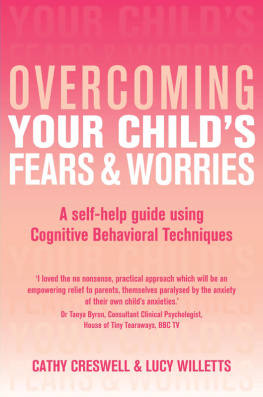
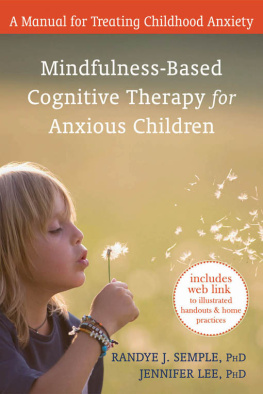
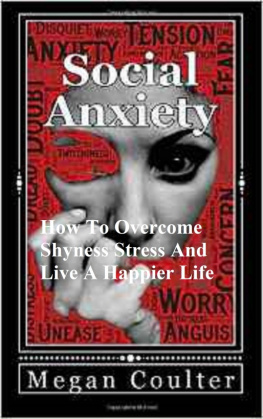
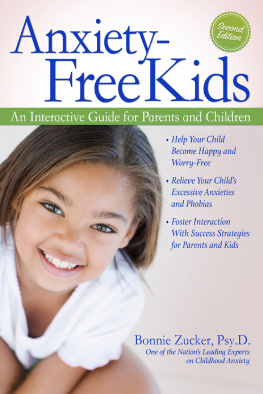
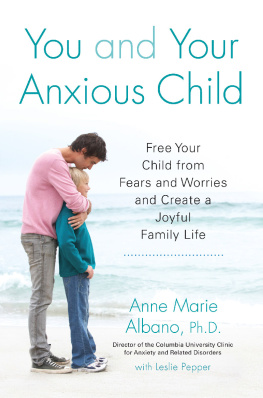
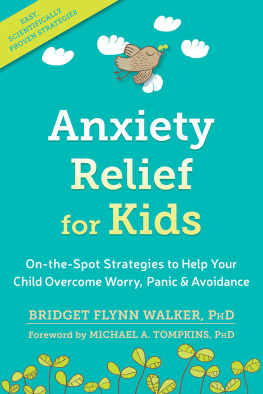
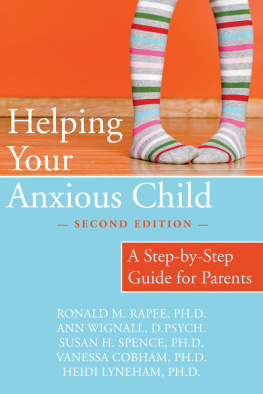

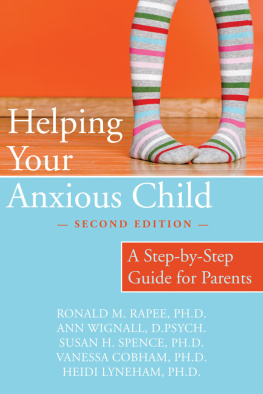

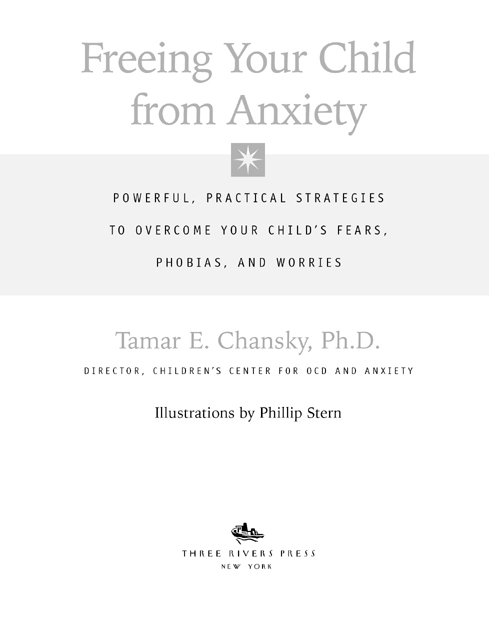
 ANXIETY DISORDER BASICS
ANXIETY DISORDER BASICS